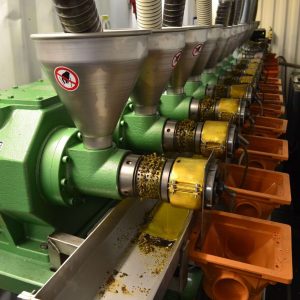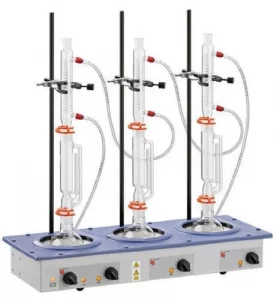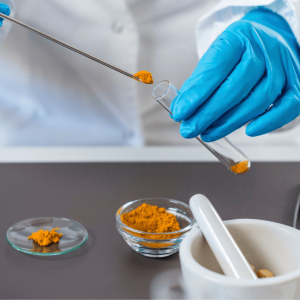The consumption of seed oils and use of seed oil extract has significantly increased over the past century. These oils, derived from various seeds such as soybean, sunflower, rapeseed (canola), and corn, have become staple ingredients in processed foods and home kitchens alike.
However, the industrial methods used in their extraction and processing have raised serious concerns regarding their impact on human health.
The methods involved in extracting these oils, along with the chemical alterations they undergo, contribute to numerous health issues, which will be discussed in this article.

Say NO to seed oil extraction
Seed Oil Extract: An Industrial Process
Seed oils are obtained through highly mechanised and chemical-laden processes. Unlike traditional methods, where oils are extracted through natural pressing, modern industry relies heavily on chemical solvents, heat treatment, and refining processes. The following steps outline the procedure:
 Step 1: Harvesting and Seed Preparation
Step 1: Harvesting and Seed Preparation
Seeds are first harvested, cleaned, and prepared for oil extraction. Often, they are subjected to drying, which helps in increasing their shelf life but can lead to the oxidation of delicate compounds within the seeds. This oxidation is known to contribute to the degradation of nutritional quality even before the extraction process begins.
 Step 2: Mechanical Pressing
Step 2: Mechanical Pressing
Mechanical pressing is one of the initial steps used to separate oil from seeds. However, due to the inefficiency of this process in extracting the maximum possible oil, additional methods such as solvent extraction are widely employed in industrial production.
 Step 3: Chemical Solvent Extraction
Step 3: Chemical Solvent Extraction
Solvent extraction, primarily using hexane, is introduced to maximise oil yield. Hexane, a petroleum-derived chemical, helps dissolve the oil trapped within the seeds. This step increases efficiency but leaves behind trace chemical residues, which may persist even after further refining. The use of hexane has raised health concerns, as its presence in food products has been linked to toxicity and potential neurological issues.
 Step 4: High-Temperature Processing and Refining
Step 4: High-Temperature Processing and Refining
Once extracted, the crude oil undergoes extensive refining. Several treatments, including degumming, bleaching, and deodorisation, are applied. High temperatures, sometimes exceeding 200°C, are utilised to remove impurities, resulting in further oxidation and degradation of beneficial compounds. At this stage, trans fats are also formed, which have been directly linked to cardiovascular diseases.
 Step 5: Chemical Additives and Stabilisation
Step 5: Chemical Additives and Stabilisation
To extend shelf life and improve stability, chemical additives such as preservatives and antioxidants are introduced. Synthetic antioxidants, such as butylated hydroxyanisole (BHA) and butylated hydroxytoluene (BHT), are frequently added, despite their controversial links to health risks, including potential carcinogenic effects.
Negative Health Impacts of Seed Oil Extract
Due to their industrial processing, seed oils contain high levels of omega-6 fatty acids, which, when consumed in excess, contribute to chronic inflammation and other health disorders.
Omega-6 to Omega-3 Imbalance
A crucial aspect of dietary fats is the balance between omega-6 and omega-3 fatty acids. Historically, humans consumed these fats in a balanced ratio. However, the heavy reliance on seed oils has led to an extreme imbalance, favouring omega-6 fatty acids. This imbalance has been associated with increased inflammation, which contributes to conditions such as heart disease, obesity, and autoimmune disorders.
Formation of Harmful Compounds
During high-temperature processing, unstable polyunsaturated fats undergo oxidation, leading to the formation of harmful compounds. These include lipid peroxides and aldehydes, which have been linked to oxidative stress and cellular damage. Prolonged exposure to these compounds has been implicated in neurodegenerative diseases and ageing-related conditions.
Increased Risk of Heart Disease
Contrary to earlier claims that vegetable oils are heart-healthy alternatives, recent studies have suggested otherwise. The excessive intake of omega-6 fatty acids from seed oils has been linked to arterial inflammation, increased oxidative stress, and an elevated risk of cardiovascular diseases. Furthermore, the presence of trans fats exacerbates these issues by raising LDL (bad) cholesterol levels while lowering HDL (good) cholesterol levels.
Impact on Metabolic Health
The influence of seed oils on metabolic health cannot be ignored. High consumption has been linked to insulin resistance, a primary factor in the development of type 2 diabetes. Furthermore, the excessive oxidation of these oils has been shown to contribute to obesity by altering the body’s natural mechanisms of fat storage and energy regulation.
Potential Carcinogenic Effects
Several studies have indicated that the byproducts formed during the processing and cooking of seed oils may have carcinogenic properties. The oxidation of polyunsaturated fats produces toxic aldehydes, which have been associated with an increased risk of cancer development. Additionally, the long-term accumulation of synthetic stabilisers and chemical residues is believed to raise further concerns about carcinogenic potential.
Safer Alternatives to Seed Oils
Considering the numerous health risks associated with industrial seed oils, healthier alternatives should be prioritised in dietary choices.
Extra Virgin Olive Oil
Cold-pressed and minimally processed, extra virgin olive oil contains a high proportion of monounsaturated fats, which are beneficial for heart health. Additionally, it is rich in antioxidants that combat oxidative stress.
Coconut Oil
Coconut oil, primarily composed of saturated fats, is more stable at high temperatures and less prone to oxidation. Despite past misconceptions about saturated fats, recent research has highlighted the benefits of coconut oil in improving metabolic health and reducing inflammation.
Avocado Oil
Similar to olive oil, avocado oil is rich in monounsaturated fats and has a high smoke point, making it a healthier choice for cooking. It provides beneficial compounds that support cardiovascular health.
Butter and Ghee
Derived from animal sources, butter and ghee are natural fats that contain fat-soluble vitamins. When sourced from grass-fed animals, these fats offer a nutrient-dense alternative to industrially processed oils.
Cold-Pressed Nut and Seed Oils
While many seed oils are extracted using harsh chemicals, cold-pressed versions retain more of their natural nutrients and antioxidants. Oils such as flaxseed oil and walnut oil provide omega-3 fatty acids and should be used raw to preserve their health benefits.
Conclusion
The industrial process of seed oil extract involves chemical solvents, high heat, and refining processes that compromise their nutritional quality while introducing harmful compounds. The excessive consumption of these oils contributes to inflammation, metabolic disorders, and chronic diseases. Given these risks, replacing seed oils with healthier alternatives, such as extra virgin olive oil, coconut oil, and butter, is strongly advised. By making informed dietary choices, individuals can reduce their exposure to harmful substances and promote long-term health and well-being.
Understanding how cooking oils are extracted can help bring more awareness to everyday food choices, especially when oils are used regularly. If you’re interested in placing these details into a wider lifestyle context, our holistic wellbeing content explores how mindful choices around food and daily habits can support long-term balance and overall wellbeing.
Here are a couple of related articles that may well interest you.